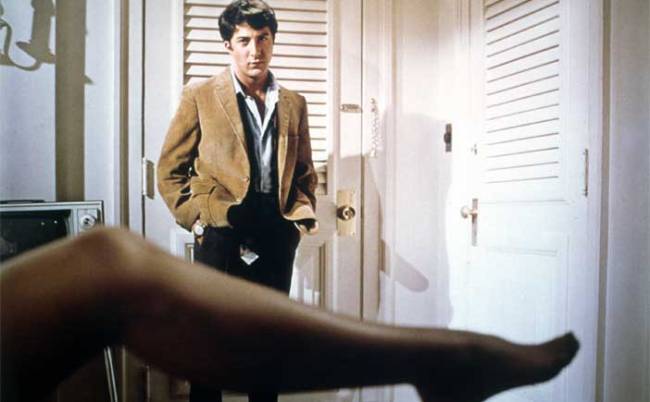Tags
age, escapism, marriage, passion, remake-book, sex, The Graduate, upper-class
Set to the sounds of Simon & Garfunkel’s moody and brewing music, director Mike Nichols plays out the story of Benjamin Braddock, a recent college graduate who is spending the summer at his parent’s mansion in the California suburbs while trying desperately to forget about his future. His plan is helped along by Mrs. Robinson, the wife of Ben’s father’s business partner, as she seduces Ben into a summer affair. Ben’s extreme awkwardness, formality, and morality are at complete contrast with Mrs. Robinson’s detachment, sex appeal, and perceived control. However, they both share a desire to forget about their current situation, Mrs. Robinson in an unhappy marriage and Ben at a crossroads between youth and adulthood. Mrs. Robinson doesn’t only give Ben something to do for the summer (ha ha), she gives him a startling insight into the generational differences between the young and the old, the sexually repressed and the sexually freed. This was extremely relevant to the sexual revolution occurring in California during the late sixties.
The idea of separation and distance is prevalent throughout the entire film, spotlighting age, responsibilities, culture, sexuality, and a whole number of other aspects of life that Ben finds himself confronted with. This not only exemplifies the generational differences between men and women in that decade but the differences between their lifestyles as well. The Graduate makes a clear distinction between the white picket fence families of the 50’s and early 60’s and the birth of the sexual revolution and increasing acceptance of the late 60’s and early 70’s. As Ben has his affair with Mrs. Robinson in the upscale black-and-white hotels, holding the door open for the stoic elderly and the energetic youth to come and go, he finds himself stuck behind Mrs. Robinson’s lack of desire to discuss herself or to talk at all, really. However, when Ben tries to alienate Elaine by taking her to the strip tease, he still can’t quite pull himself away by her openness and desire to listen and discuss.
The Graduate’s critique on society is subtle, yet powerful. Benjamin’s entire crisis throughout the majority of the film is based on the stifling power of the previous generation. Even when Ben thinks he’s breaking out of it by sleeping with an older, married woman, he’s only continuing the trend. It is not until he decides to marry Elaine (though she doesn’t quite agree with him right off the bat) that he really seems to hold his ground and make some progress toward the next generation and the new age. The impact really comes through at Elaine’s wedding as she’s being basically kidnapped by Ben and responds to her mother’s outraged “it’s too late” with “not for me.”
However, as Elaine and Ben escape from her wedding and hop on the conveniently placed bus to Who-Knows-Where, another message comes through. Their adrenaline and ecstasy mellows and their smiles fade ever so slightly. The rush that came with breaking down the barriers and taking charge has faded, and their future still comes barreling through. Even after all that’s happened, who’s to say that the next generation won’t make the mistakes of the one before it?
As the ever so wise soundtrack predicts,
“And the vision that was planted in my brain
Still remains
Within the sound of silence.”
-Grace

